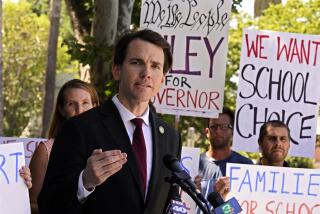Campaign Finance System Needs Repair, Party Chiefs Say
- Share via
WASHINGTON — The chairmen of the Republican and Democratic parties denounced the current campaign finance system Thursday, even as the Democratic National Committee said that it was returning two more contributions from a foreign source.
Sen. Christopher J. Dodd of Connecticut, the Democrats’ general chairman, described the current system as a “wild West” of unfettered fund-raising. He said Congress must address broader problems of “soft money” contributions by corporations and other special interests.
Republican Party Chairman Haley Barbour said he sees the biggest problem as unlimited labor-union spending financed by members’ dues. The two chairmen, whose parties broke all records in raising special-interest money this year, expressed their views at a breakfast with members of The Times Washington Bureau.
In a related development, the Associated Press reported that John Huang, the central figure in the controversy over foreign money, was granted an exemption from required background checks six months before beginning a government job at the Commerce Department.
An agency security official authorized the exemption and granted top-secret clearance to Huang on the grounds that his help was needed immediately.
“Huang is granted this waiver due to the critical need for his expertise in the new administration for Secretary [Ronald H.] Brown,” the Jan. 31, 1994, memo said. Huang did not begin his job until July 18, 1994.
The Democratic National Committee said Thursday that it had returned two contributions totaling $50,000 from a Greek company that had not generated the money from its U.S. operations. The $50,000 came from Psaltis Corp., whose owner, George Psaltis, was represented by the Washington-based law firm of Hogan & Hartson.
“There was no reason to question the legality of the contribution,” DNC spokeswoman Amy Weiss Tobe said. But, she said, Hogan & Hartson “came back to us a few days ago and indicated that the contribution was inappropriate because the sole owner was a Greek national and the company did not have income from its U.S. operations at the time the contributions were made.”
Federal campaign finance laws prohibit the acceptance of money from a foreign company if the company’s U.S. operations did not earn at least the amount of the contribution.
Hogan & Hartson said in a statement that after making contributions of $10,000 and $40,000 last summer, “the firm and the client reviewed the question of whether the contributions should have been made and suggested that they be returned.”
To date, the Democrats have refunded 11 “soft money” donations totaling $772,000 in the weeks following disclosure of a series of illegal or suspect donations, most of them solicited by Huang, who became vice chairman of the DNC finance committee after leaving the Commerce Department in December 1995. The Federal Election Commission is investigating several six-figure donations Huang solicited that proved to be illegal or suspect.
“Soft money” is a form of contribution that labor organizations, corporations and other organizations and individuals give to political parties, rather than to individual candidates. Contributions to candidates are limited by federal law to specific amounts. There are no ceilings on the size of soft-money contributions, but there are laws prohibiting foreign sources from donating.
The party money can be used for such activities as voter registration and other steps considered helpful to building the party, but it cannot be used to advance the cause of a specific candidate. It has been increasingly used to advance specific positions on issues, a trend that some critics believe is skating close to violating federal campaign finance law.
Dodd pointed out what he called an irony of the current campaign finance system: “We’ve spent more money than has ever been spent in political campaigns and had the lowest [voter] turnout since the 1920s.”
Barbour said that whatever attempt is made at rewriting campaign finance laws should deal with the role unions play in contributing funds raised from union dues to political activities.
Barbour said the AFL-CIO concedes that 40% of union members vote for Republicans.
“Money’s being taken from them out of every paycheck, given to the union. The union’s turning around and spending it to elect Democrats. . . . It’s unconscionable. It’s unacceptable,” he said.
Times staff writers Alan C. Miller and Glenn F. Bunting contributed to this story.
More to Read
Get the L.A. Times Politics newsletter
Deeply reported insights into legislation, politics and policy from Sacramento, Washington and beyond. In your inbox twice per week.
You may occasionally receive promotional content from the Los Angeles Times.










